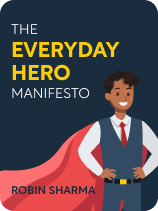

This article is an excerpt from the Shortform book guide to "The Everyday Hero Manifesto" by Robin Sharma. Shortform has the world's best summaries and analyses of books you should be reading.
Like this article? Sign up for a free trial here.
Do you admire heroes like Superman and Wonder Woman? Did you know you can also be a superhero?
For Robin Sharma, a hero is an ordinary person who lives in an extraordinary way. You don’t need to be a genius or have any exceptional talents to be a hero in Sharma’s eyes—you just need to fully commit to your purpose in life, exhibit positive attributes, and try to make the world a better place.
Discover how to become a hero, according to The Everyday Hero Manifesto.
Principle 1: Focus on the Tasks That Matter
Want to know how to be a hero? Robin Sharma’s first principle is to do work that matters. Stop just keeping yourself busy, and start doing meaningful, purposeful work.
Sharma notes that often, we equate “having a busy life” with “being productive.” However, if your time is packed with busy work and distractions, rather than work that advances you toward your meaningful goals, then you’re not truly being productive. Further, you’re not living up to your heroic potential. You must replace mindless distractions and less-impactful tasks with purposeful and rewarding work.
For instance, imagine you currently spend an hour each workday in meetings that don’t really require your attendance and an hour each evening scrolling social media. To use that time more wisely and heroically, you might spend it developing your professional skills, creating art that holds significant meaning for you, or doing volunteer work for a cause you believe in. You might also spend time helping others—we’ll discuss the importance of this in detail later.
| What If You Can’t Eliminate Less Impactful Tasks? It may not be possible to eliminate all less-impactful tasks from your schedule and replace them with work that feels more meaningful and purposeful. For instance, in the workplace, you may have no choice but to complete tasks that don’t feel that meaningful to you—if your boss mandates that they’re part of your job, you have to do them (or risk censure). In this case, you might tell yourself that, while you can’t eliminate all meaningless work from your schedule, you can make a conscious effort to dedicate as much time as possible to things that feel purposeful. Focus on eliminating the less-impactful activities that are in your control—for example, your social media usage. |
Principle 2: Build Self-Confidence
Stop saying “I can’t,” and start saying “I can.”
Sharma means this literally. The words you say affect your mindset, so every time you say “I can’t,” you’re weakening yourself, and every time you say “I can,” you’re empowering yourself.
(Shortform note: It’s not just the words you say that can impact your mindset. According to some psychologists, the words you hear can affect you too—and in turn, impact your performance at work and in social situations. For example, a study from 2020 showed that student athletes were happier and played better in games where they were cheered on by a teacher, compared to games where they got no verbal encouragement. However, the opposite is also true: Hurtful words, such as bullying and insults, can lower your confidence and hinder your effectiveness at work.)
To boost your confidence and get in the habit of using empowering words, Sharma suggests that you start each day with a simple mantra (a word or short phrase that focuses your thoughts). For example, before you get out of bed in the morning, you might say, “Today I will be kind, enthusiastic, and productive.”
You can also use words to guide your mind away from negative thoughts. For instance, if you notice self-defeating or belittling thoughts creeping in, say something like, “Let’s not think about that,” or, “That’s not who I am.”
| Using Mantras for Mental Empowerment Sharma implies that saying an empowering phrase just once will focus your thoughts and boost your confidence, but a mantra is typically something you repeat over and over while meditating. A session of mantra-based meditation (MBM) could last anywhere from a few minutes to half an hour. Some research supports Sharma’s claim that mantras can help you feel empowered and shut out negative thoughts. For instance, mantra-based meditation (MBM) can lead to significant improvements in your mental health, reduce stress and anxiety, and help relieve symptoms of depression. |
Principle 3: Take Responsibility
Stop making excuses, and start taking responsibility.
Sharma says that your power comes from taking responsibility for everything in your life—that it’s up to you, and nobody else, to create the life you want. Blaming other people or circumstances for your problems might soothe your ego, but it will also trap you in a mindset of helplessness: You’ll convince yourself that you’re powerless and there’s no point in trying to improve your situation.
For example, an aspiring author sometimes needs to submit a manuscript to dozens of different publishers before one of them accepts it; even then, the author might have to do numerous revisions before it’s ready for publication. An author who takes responsibility for her own outcomes will do that and whatever else is necessary to get the book published. On the other hand, an aspiring author who doesn’t take responsibility might soothe her ego by blaming a rejection or set of extensive revisions on the publisher, the industry, or anything else that makes it someone else’s problem. She might decide that she simply can’t succeed in these hostile conditions and give up on finding a publisher for her book.
| Responsibility Isn’t Blame There’s a common misconception that taking responsibility (or accountability) is akin to saying that your problems are your own fault. As a result, many people don’t want to take responsibility for their lives; it feels like admitting that they did something wrong. However, self-help expert Mark Manson (The Subtle Art of Not Giving a F*ck) explains that there’s a crucial difference between accepting responsibility and accepting blame. Whatever problems you’re facing might not be your fault, but it’s still your responsibility to deal with them; you’re the only one who can fix your problems. For example, if you had a traumatic childhood, that’s in no way your fault—but you’re still the one who has to heal from that trauma and learn how to live a happy, fulfilling life. Manson’s tip for taking accountability is to recognize that you’re always making choices, no matter what situation you’re in. Even when you feel completely powerless—say, if you’re stuck in a hospital or in prison—you’re still in control of your actions and your attitude, and by recognizing that, you’re accepting responsibility to deal with your situation. You can still consider why you’re in that situation, think about how it could help you, and decide to make the best of it. If you do the opposite and spend your time there sulking or robotically going along with what people tell you to do, that’s also a choice you’re making—and you’re not accepting responsibility to improve your situation. |
Principle 4: Be Resilient
Stop getting discouraged, and start getting motivated.
Sharma says that an everyday hero finds inspiration in hardship and failure; every setback is a chance to learn and a reason to improve. For example, if you were passed over for a promotion at work, that’s an opportunity to ask your boss how you can become a better employee—and to transform your disappointment into motivation to work harder.
Further, stop brooding about events that left you feeling bitter or regretful. If there’s a lesson to learn from those events, learn it, then let the memories go. Reflect on your joys and triumphs—remember the great things you’ve already done, so you’ll know that you can overcome your current struggles.
(Shortform note: In this section, Sharma recommends letting go of hurtful memories by meditating on your successes. Practicing gratitude meditation specifically is a great way to remind yourself of the great things you’ve accomplished and come to terms with difficult or upsetting events. A key part of gratitude meditation is to practice feeling grateful for the things in your life that seem negative, such as losing a job, in addition to your joys and triumphs. Through gratitude meditation, you’ll often find that those seemingly-bad experiences were crucial in helping you learn valuable lessons or build mental and emotional resilience, thereby making you better able to handle future challenges.)
| How to Move Past Failure and Disappointment The difference between someone who learns from failure and someone who unhelpfully broods on it is often ego—an overblown sense of one’s own importance or abilities. As Ryan Holiday explains in Ego Is the Enemy, an egotistical person will often refuse to learn from failure because they take it personally—they view failure and disappointment as direct personal attacks and therefore become defensive instead of responding rationally. For instance, if you fail a test, your ego might drive you to blame your teachers, the exam proctors, or the test itself, meaning that you’ll see no reason to address your own shortcomings. However, if you’re able to set aside your ego, you can then recognize where your own skills and knowledge fell short and work on fixing those shortcomings so that you’ll pass the next test. |
Principle 5: Live Selflessly
Don’t just do great things; do great things for others.
Sharma says an everyday hero understands that helping others is the best way to enrich your own life and find true happiness, satisfaction, and pride in who you are. Therefore, make helping others your greatest passion—in other words, use your heroic abilities to benefit others, not just yourself.
This final principle goes directly against the common belief that there’s not “enough” for everyone: enough money, enough resources, enough respect, and so on. People who hold this belief try to take whatever they can, at everyone else’s expense, because they’re afraid of not having enough resources for themselves.
This selfishness is an ancient and deeply-rooted survival instinct, but it’s one that you can overcome through compassion and rational thinking. Sharma urges you to recognize that the world today is very different from how it was for our ancestors; today, there is enough for everyone to survive and be happy.
(Shortform note: Sharma is saying that humans have evolved to be selfish because our ancestors had to be selfish in order to survive. However, some people disagree with this perspective. For instance, Richard Dawkins explains in The Selfish Gene that animals (including humans) engage in both selfish and selfless behaviors to maximize their odds of survival. In other words, we’re not genetically programmed for pure selfishness; in fact, living in tribes where people could take care of each other was crucial to early humans’ survival. Furthermore, recent research suggests that there’s no reason for people to selfishly fight over resources—one study says that the Earth can support three times the current population if we use its resources wisely.)
| Help Yourself by Working Hard for Others Philosophers from many different schools of thought believe that making the world a better place isn’t just a moral duty, but also the best way to live a satisfying life. In other words, even from a selfish perspective, working hard and doing your best for others is worth the effort; by helping other people, you’ll also make yourself happy. In The Monk Who Sold His Ferrari, Sharma himself offers one possible explanation for why that is: You’re part of the world, not just an isolated individual living in it. Therefore, by improving the world around you, you’re also improving yourself and your circumstances. Further, Marcus Aurelius’s Meditations—one of the definitive texts on Stoicism—says that working for the common good is the only way to live a happy and fulfilling life. Aurelius’s reasoning is that to feel fulfilled, you must have a consistent goal (what Sharma would call your purpose) and spend your life working toward that goal. However, people are naturally inconsistent; your personal desires and goals will change frequently. Therefore, any fulfilling goal must be selfless rather than oriented around your ever-changing personal preferences. |

———End of Preview———
Like what you just read? Read the rest of the world's best book summary and analysis of Robin Sharma's "The Everyday Hero Manifesto" at Shortform.
Here's what you'll find in our full The Everyday Hero Manifesto summary:
- Why you don't need superpowers in order to achieve great things
- How to unlock your heroic potential and become a force for good
- Why helping others is the best way to enrich your own life






